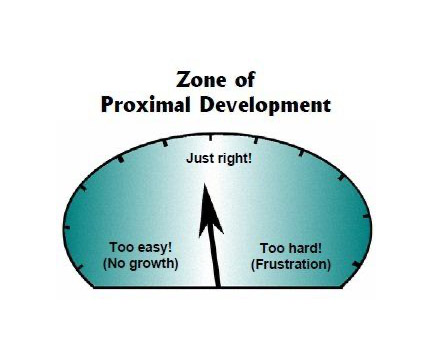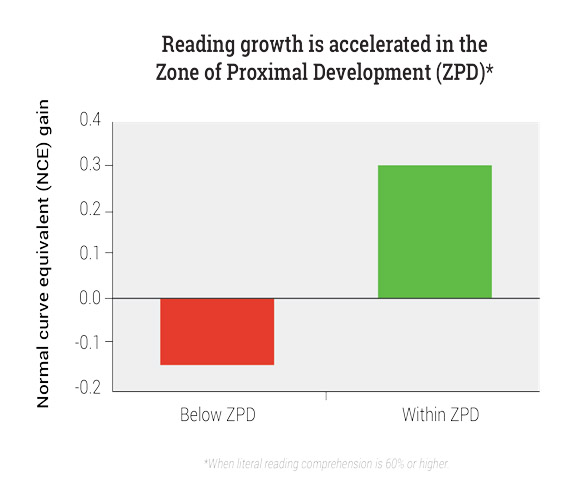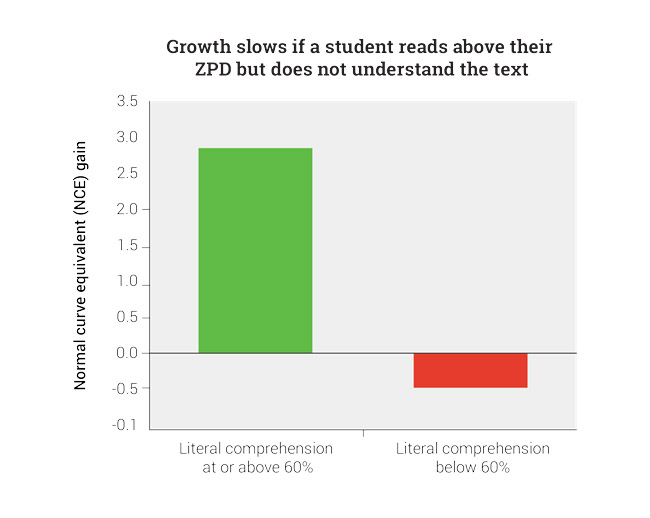Reading Practice – Zone of Proximal Development
Kids need more reading practice, I don’t think anyone would argue that fact. But, reading practice doesn’t just help struggling readers get on track for success; it helps all students!
We would like to think that just sending our kids to school each day would be all that is needed to help them grow and excel in their reading. But the strained resources of our school districts and overworked teachers simply don’t allow enough time or energy to be focused on this key aspect. In the last two blogs I’ve shown how reading engagement and reading practice can increase a student’s vocabulary and skills. We’ve also discussed how our students, on average, are reading less, and unfortunately are not reading at a level of proficiency we would expect. This is where parents, grandparents, aunts, uncles, etc. should get involved and make sure the kiddos are reading at home and encouraging them to read things that they will enjoy and challenge them!
In this blog, I want to introduce a key concept that we should be aware of when encouraging our kids to read more.
The Zone of Proximal Development
The concept of Zone of Proximal Development (ZPD) was first developed by a Russian psychologist Lev Vygotsky. ZPD is It is “the range of abilities that an individual can perform with assistance but cannot yet perform independently.” While this may sound complex, this concept is much more easily digested with a few simple graphs below. The concept of Zone of Proximal Development (ZPD) was first developed by a Russian psychologist Lev Vygotsky. ZPD is It is “the range of abilities that an individual can perform with assistance but cannot yet perform independently.”
In Literacy and Reading, we frequently use ZPD to describe the range of complexity that a student can read independently but not effortlessly—some may also call this a student’s “instructional level” or “independent reading level.” Reading materials in a student’s ZPD should offer just enough challenge to help them build stronger reading skills, but not so much that they become frustrated and discouraged from further reading. Think of an athlete or weightlifter as they increase their training and intensity to grow stronger and faster, progressive improvements, ZPD is essentially the same concept.
A study of more than 2.2 million students by Renaissance Learning showed that students achieved accelerated reading gains—that is, grew at a faster rate than the national average—when they read within their ZPD, but did not when they read below their ZPD.
ZPD represents an optimal range of reading complexity a given student, but it’s important to note that not everything a student reads must be within their ZPD. It’s important to let kids enjoy the reading process and “read for fun”! As long as a student is reading plenty of materials within their ZPD and hitting growth goals, there is no reason to prevent them from reading some below-ZPD materials.
There can be a great benefit to exposing children to materials that are above their ZPD. One way to do this at home is to read aloud to your kids and use books that are a little more advanced or reading together (hint – bedtime stories, read-aloud to your child), these are just a couple of examples of how to introduce the more complex text to your child.
However, just like an athlete who tries to train too hard and gets injured, introducing books that are too far advanced for your child can actually slow down their growth and more importantly could hinder their motivation!
For parents, the takeaways:
- Encourage lots and lots of reading with your child’s instructional level.
- Encourage your child to read things that interest them and then work to introduce them to other topics as they gain confidence and skills.
- Don’t get carried away with giving them books over their level, keep them motivated and learning!
- The Reading Ranch is here to help. Our motto is to “Make Reading Fun” and we love our jobs. Don’t hesitate to contact us!
The Reading Ranch is here to help.
Our motto is to “Make Reading Fun” and we love our jobs. Don’t hesitate to contact us!



